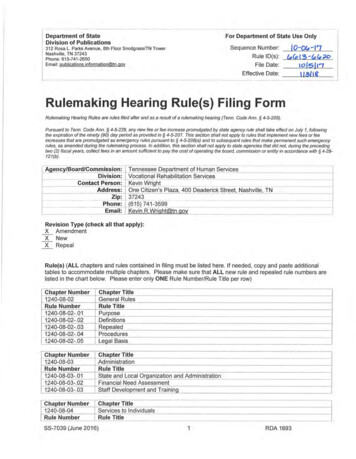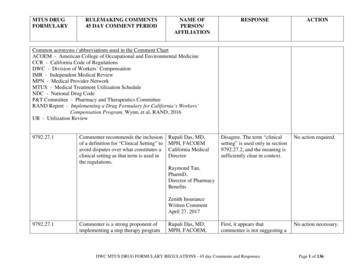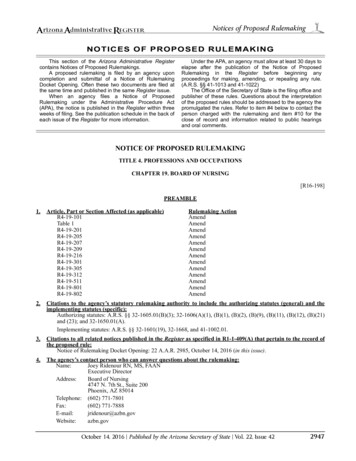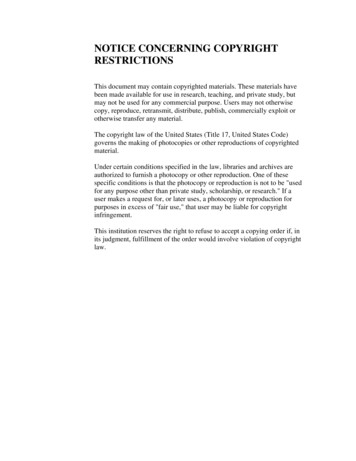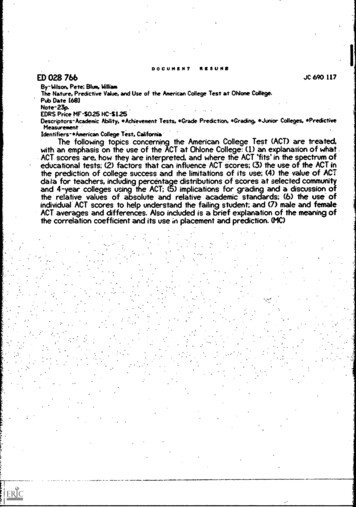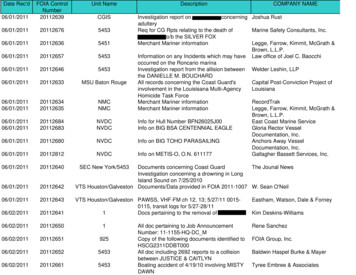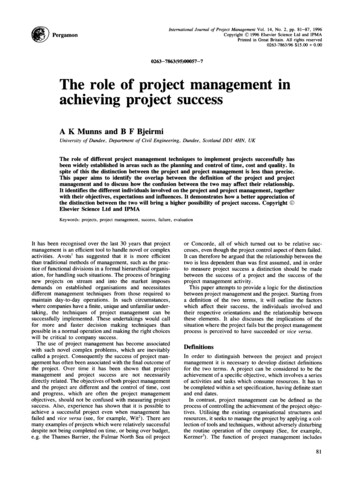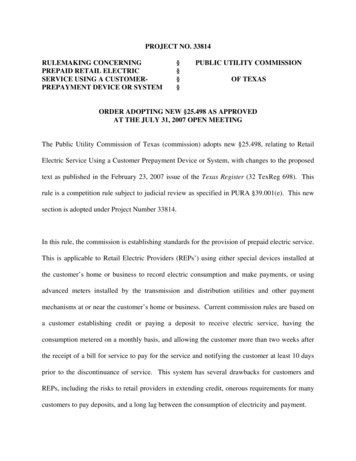
Transcription
PROJECT NO. 33814RULEMAKING CONCERNINGPREPAID RETAIL ELECTRICSERVICE USING A CUSTOMERPREPAYMENT DEVICE OR SYSTEM§§§§PUBLIC UTILITY COMMISSIONOF TEXASORDER ADOPTING NEW §25.498 AS APPROVEDAT THE JULY 31, 2007 OPEN MEETINGThe Public Utility Commission of Texas (commission) adopts new §25.498, relating to RetailElectric Service Using a Customer Prepayment Device or System, with changes to the proposedtext as published in the February 23, 2007 issue of the Texas Register (32 TexReg 698). Thisrule is a competition rule subject to judicial review as specified in PURA §39.001(e). This newsection is adopted under Project Number 33814.In this rule, the commission is establishing standards for the provision of prepaid electric service.This is applicable to Retail Electric Providers (REPs’) using either special devices installed atthe customer’s home or business to record electric consumption and make payments, or usingadvanced meters installed by the transmission and distribution utilities and other paymentmechanisms at or near the customer’s home or business. Current commission rules are based ona customer establishing credit or paying a deposit to receive electric service, having theconsumption metered on a monthly basis, and allowing the customer more than two weeks afterthe receipt of a bill for service to pay for the service and notifying the customer at least 10 daysprior to the discontinuance of service. This system has several drawbacks for customers andREPs, including the risks to retail providers in extending credit, onerous requirements for manycustomers to pay deposits, and a long lag between the consumption of electricity and payment.
PROJECT NO. 33814ORDERPAGE 2 OF 73Based on the information provided in this proceeding, the commission concludes that prepaidservice will be a valuable option for REPs’ and for many customers, because it can reduce REPs’credit risk, eliminate the need for deposits, permit customers to make smaller, more frequentpayments, and shorten the lag between consumption and payment, providing customers betterinformation about the costs of their consumption decisions. The rule that the commission isadopting exempts REPs that are providing prepaid service under this rule from certain customerprotection rules, but the commission’s objective in adopting this rule is to provide customers anoption that they may find valuable and preserve customer protections that are appropriate for thisservice. In addition, the commission is adopting customer protections that are peculiar to thisprepaid service, such as requirements regarding how payments may be made and how quicklyservice must be restored if a customer allows its credit balance to expire and then makes anadditional payment to restore service. Prepaid service has been used in other states and countriesand is being used by at least one electric cooperative in Texas, and the commission believes thatthis service will meet a need in the competitive retail market.The commission received initial written comments on the proposed new rule from the ElectricReliability Council of Texas (ERCOT), CenterPoint Energy (CenterPoint), Office of PublicUtility Counsel (OPUC), Reliant Energy Inc. (Reliant), REPower Energy (REPower), TXUCities Steering Committee (Cities), TXU Energy Retail Power Company (TXU Energy), andTexas Legal Services Center (TLSC). Reply comments were filed by AARP Texas (AARP),CenterPoint, Cities, OPUC, REPower, TLSC, and Texas Ratepayers Organization to SaveEnergy (Texas ROSE).
PROJECT NO. 33814ORDERPAGE 3 OF 73Public hearings on the proposed rule were held at commission offices on April 13, 2007, at 10:00a.m., and on April 18, 2007, at 1:00 p.m. Representatives from Community Action Committee(CAC), Community Action Committee Victoria (CAC Victoria), Combined Community Actionof Giddings (CCA Giddings), OPUC, REPower, Save the Family (STF), TLSC, TexasAssociation of Community Organizations for Reform Now (ACORN), TXU Energy, and TexasROSE attended the hearings and provided comments. To the extent that these comments differfrom the submitted written comments, such comments are summarized herein.All comments, including any not specifically referenced herein, were fully considered by thecommission.Texas ROSE urged the commission to delay the adoption of the proposed changes to thecustomer protection rules until more information can be gathered on the potential impacts ofprepaid service on residential consumers. However, Texas ROSE offered that if a rule isadopted, it should include several important provisions.These provisions include: (1)prohibiting critical care and seriously ill and disabled customers from taking “selfdisconnection” prepaid electric service, (2) providing clear disclosures regarding the features andlimitations of the service and information about other REPs and electric plans available to theconsumer, (3) providing a clear disclosure of how the service may affect the customer’s ability toqualify for energy assistance programs, and (4) requiring any landlord working as a REPoweragent to follow the commission rules and fully disclose product information as recommended byTLSC and Texas ROSE in filed comments.
PROJECT NO. 33814ORDERPAGE 4 OF 73In its public hearing comments, Texas ROSE stated that “we are not convinced that the serviceREPower is offering is safe for Texas residential consumers, particularly the low-income, elderlyand disabled.” Texas ROSE added that by allowing REPower to offer its prepaid meter servicewithout the customer protections required of all other REPs may result in unsafe livingconditions and even loss of life. Texas ROSE also commented that it believes the proposed rulemay result in problems, which it views as an unreasonable risk to take for the sake of saving theconsumer the cost of transaction fees that the commission already has the authority to lower, andthat REPs have the ability to waive.Commission responseThe commission does not agree with Texas ROSE that research on the effects of prepaidelectric services is incomplete and inconclusive. Information was presented during thepublic hearings that demonstrate the benefits to the customers of prepaid service using acustomer prepayment device or system (CPDS). The commission disagrees with TexasROSE’s assertion that the commission could resolve transaction fees issues by simplylowering fees that the REPs charge to customers for related services. These services have acost that can be avoided through remote connection and disconnection. The commissionagrees with Texas ROSE that it should limit the circumstances under which seriously ill orcritical care customers would be allowed to take prepaid service using a CPDS, and hasadded provisions accordingly. The commission agrees with Texas ROSE that REPs shouldprovide a clear disclosure and information regarding the features and limitations of theirprepaid services. The commission further agrees with Texas ROSE that any landlord
PROJECT NO. 33814ORDERPAGE 5 OF 73working as an agent of a prepaid REP using a CPDS shall be required to follow allapplicable commission rules, and shall fully disclose product information to tenants.Regarding disconnection, Texas ROSE discussed the provisions to exempt REPower from thePUC disconnection rules, which Texas ROSE views as a fundamental change in the offering offirm service to Texas residential electric consumers. Texas ROSE cautioned that this step shouldnot be taken without fully considering all the consequences for residential consumers.Commission responseThe commission believes the benefits of prepaid services using a CPDS outweigh any“consequences” as posed by Texas ROSE.The commission has added disclosureprovisions, in renumbered §25.498(d), which address Texas ROSE’s concerns aboutcustomer disclosures. The commission does not believe that a prepaid REP should beexempt from all disconnection rules, and has addressed those provisions accordingly.Texas ROSE provided additional background in comments pertaining to prepaid programs inArizona and Great Britain. Texas ROSE concluded that there is little experience world-widewith the type of technology and electric service plan being offered by REPower. While notingthe information provided by REPower describing the success of Arizona’s Salt River Project(SRP) prepaid program, Texas ROSE stated that it would be helpful to have information andconclusions about that program from an independent, objective source, rather than from SRPitself. Texas ROSE added that it does not view SRP as a valid comparison for the prepaidelectric service using a customer premise device proposed by REPower, and urged the
PROJECT NO. 33814ORDERPAGE 6 OF 73commission to exercise extreme caution in making special allowances for prepaid service plansat the expense of customer safety.Texas ROSE commented on several important differences between the prepaid service packagebeing offered by SRP and REPower. It noted that the SRP’s M-Power program operates under aregulated tariff and is targeted toward low-income customers or customers with poor credithistories. The rates charged by SRP for prepaid service are similar to the charges paid by regularresidential customers and are predictable.Texas ROSE stated that the rates charged byREPower are among the highest rates available, and the rate is subject to change at any time.Texas ROSE added that the SRP Program is not available to customers with medical life supportequipment, whereas the rule being considered by the commission does not prohibit residentialcustomers dependent on electricity to operate life support equipment from taking prepaid servicefrom REPower.STF, a nonprofit organization that said it represents the interests of low-income residents inArizona, provided comments pertaining to its experiences with SRP’s M-Power program. STFsaid that the M-Power program has been in place for the past 10 years, and that it has found it tobe a powerful and useful resource tool, helping STF to move their families to a differenteconomic level. STF said the M-Power program works well for many homeless and low incomefamilies. In Arizona, the summer begins in March and lasts through October. STF said thatmany families that are referred to the STF assistance program are unable to obtain affordablehousing and cannot afford utility bills.
PROJECT NO. 33814ORDERPAGE 7 OF 73STF summarized that customers participating in the M-Power program have the followingbenefits: (1) immediate feedback concerning their electric energy usage, provided through adaily electronic log of power usage and expense, that promotes “real time” change in utilityusage and allows families to see the differential costs of energy usage throughout the day andweek, (2) ability to learn how to better budget for utility costs on a monthly basis, (3) ability tolearn the real costs of utilities in their household without the penalty of accumulating largeelectricity bills in the process (particularly important for low-income families who cannot “getout from under” large electricity bills in Arizona, that affect their credit history and ability toaccess utilities in the future), (4) provide parents an opportunity to educate their children aboutenergy costs and the benefits of energy conservation, and (5) provide families an opportunity andincentive to become aware of and develop life-long changes in energy usage strategies.Regarding whether STF participants are able to understand the program to preventdisconnection, the STF representative said, “trust me, they make it work.” STF added furtherthat “their families become so empowered and comfortable with the results” from the use of theM-Power system while they receive benefits from the STF program, that when they transitionout of the program they request the M-Power equipment be installed in their new residence.Commission responseThe commission acknowledges Texas ROSE’s observations on the differences between theregulated market in Arizona and the competitive market in Texas, where REPower seeksto offer prepaid services.While there are differences in the markets and programsproposed to be offered, the commission believes that STF has provided compelling
PROJECT NO. 33814ORDERPAGE 8 OF 73information that demonstrates that customers can benefit from and adapt to prepaidelectric service using a CPDS.Texas ROSE stated REPower’s latest terms of service agreement states that the landlord is thecustomer of record for the electricity services for the apartment unit with a prepaid customerpremise device and the landlord is a REPower agent. Texas ROSE commented that it found ittroubling that in the terms of service agreement, the customer gives the landlord the right toallow REPower to terminate delivery of service at any time. Texas ROSE said using thelandlord as an agent of the REP is much different than the SRP M-Power program, where thecustomer has a direct relationship with the utility company and there is no middle-man.OPUC also commented on the role of the landlord in the prepaid model, and offered languagethat would prevent the landlord from initiating interruptions.Commission responseThe commission agrees with OPUC that even if listed as the customer of record, landlords,property managers or property owners shall not be allowed to request or effectuateinterruptions of their tenants taking service using a CPDS. The commission has addedlanguage to prevent such persons from effectuating interruptions.Texas ROSE noted that studies indicate that the SRP M-Power customers are, on average,reducing their electricity usage by 12.8%. Texas ROSE added that the claimed 12.8% savingsshould be compared to the savings that can be realized through a traditional energy efficiency
PROJECT NO. 33814ORDERPAGE 9 OF 73program. Texas ROSE also noted that a study has been conducted in Great Britain whereapproximately 30% of customers take prepaid service, indicating that 34% of customers withprepayment meters were disconnected a least once during the previous year, usually because of alack of cash. Texas ROSE also raised concern for the safety of small children who may be leftwithout light or heat, because electricity is not available.Texas ROSE commented that SRP reports that customer satisfaction rates for customers usingM-Power are at 84 to 90%. Texas ROSE concluded that both SRP and REPower claim savingsto consumers under the prepaid meter plan, due to the absence of security deposits, late fees, andreconnection fees because the customer self-disconnects. Texas ROSE believes that if fees arean issue for residential consumers, there are other solutions to the problem of high fees than theprepaid service models in use by SRP and REPower. Texas ROSE said that customers who wishto prepay are not prohibited from doing so with traditional service while still maintainingcustomer protections.Commission responseThe commission believes the information provided by STF concerning participants in theSRP M-Power program demonstrates that prepaid service using a CPDS has numerousbenefits to customers. Customers have ability to monitor their energy consumption in nearreal-time, reduce electric consumption if they choose, and pay-as-they-go for electricservice. There is no evidence that the safety risks associated with prepay services usingCPDS are substantially different than those using traditional electric meters, wherecustomers may have to wait hours or days for a crew to physically restore service after an
PROJECT NO. 33814ORDERPAGE 10 OF 73interruption. The commission disagrees with Texas ROSE that a customer satisfactionrate of 84 to 90% is not encouraging, and believes that this is a substantial satisfaction rate.A current REPower customer from Texas provided comments describing her experiences withthe company and how she has benefited from the prepaid service using a customer-premisedevice. The customer stated that she thoroughly enjoyed the benefits of prepaid service. She isa single mother, and liked the service, because: (1) it is hard to make the large deposits that otherREPs require, (2) other REPs have additional fees, (3) it was hard to understand the meter orhow it works in the traditional model, and (4) prepaid service allows her to “go right to the box,push the button, and see how much (power) I used yesterday.” The customer added that prepaidservice helps her to better manage electricity. The service gives her the option of controllinghow much to use and how much to spend. Previously, she noted, she had to “scrape by” to payher electric bills. Now, with the prepaid service, she said she doesn’t experience those problems.She also noted that the nearest pay station was less than one mile away.Herb Roberts with REPower provided a presentation with information regarding the differencesin the market between an interruption of service and a disconnection. REPower contended thatthere is a real difference between interruption of service and a disconnection of service.REPower argued that with an interruption, “customers are in control.” REPower added that inthe prepaid model, customers can better budget their expenses, and prevent disconnections.Customers have access to real-time information, can pay-as-they-go, and can budget theirelectricity expenses, REPower noted.
PROJECT NO. 33814ORDERPAGE 11 OF 73Commission responseThe commission agrees with REPower that prepaid services provide many benefits tocustomers, including ability to better monitor and control electricity consumption.ACORN, representing 27,000 member families in Texas, provided comments that it opposesprepaid service using special meters with disconnection ability.ACORN believed thatcustomers using prepaid services will most likely pay the highest electric rates, and may never beable to receive electric bill payment assistance.ACORN acknowledged that in the prepaid model, there are benefits such as the elimination oflate fees experienced in the traditional credit model. However, ACORN argued that there areother ways in which the customers using customer-premise devices may be penalized. BothACORN and OPUC pointed out that there may be transaction fees if the prepaid service includesa prepaid card, where customers are required to pay a transaction fee each time they load moneyon the card to obtain continued service.CAC commented that it was concerned that REPower would only accept cash as a valid form ofpayment. CAC was also concerned with additional processing fees that could be charged tocustomers. CAC Victoria and CCA Giddings raised similar concerns in comments. ACORNcommented that with prepaid service, when the money runs out, the power goes out. ACORN,TLSC, AARP, and OPUC all expressed additional concern for critical care and seriously ill anddisabled customers and recommended that those customers be prohibited from taking prepaidservice. ACORN added that prepaid service could potentially “rip-off” the neediest customers.
PROJECT NO. 33814ORDERPAGE 12 OF 73Commission responseThe commission acknowledges the concerns listed by these commentors. However, thecommission believes that the benefits of prepaid services outweigh the costs of such service.The commission is not adopting a rule for one specific company, but a generic rule forprepaid service using meters with special functions. Many REPs may wish to offer prepaidservice using a CPDS. This includes REPs that plan to offer prepaid service using a systemthat interfaces with a transmission and distribution utility (TDU) advanced meters as theyare deployed.The commission disagrees with ACORN that prepaid service couldpotentially “rip-off” the neediest customers; rather, those customers who have difficultybudgeting to pay large monthly power bills, incur onerous deposits, and frequently pay feesfor disconnecting and reconnecting service will now be able to pay for power on a morefrequent basis and will have a greater chance of keeping the “lights on.”Regard
PREPAID RETAIL ELECTRIC § SERVICE USING A CUSTOMER-§ OF TEXAS : . and a long lag between the consumption of electricity and payment. . REPower Energy (REPower), TXU Cities Steering Committee (Cities), TXU Energy Retail Power Company (TXU Energy), and Texas Legal Services Cente
